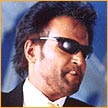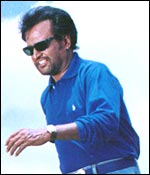
|
'There is no Rajni in Baba!'
A look at whether Baba lives up to the hype
|
N Sathiya Moorthy in Chennai
The more charitable say it takes a Rajnikanth to produce a political film with spiritual overtones. Others say it is as confused and as confusing as the man.
It is becoming increasingly clear that Baba may not be what the pre-launch and pre-release media hype made it out to be. As a mediaperson says, "If you look for Rajnikanth, the movie is not there. And if you look for the movie, Rajnikanth is not there."
Here is another view: "If you look for the movie, it is not there. If you look for Rajnikanth, he is not there."
Rajnikanth, the uncrowned superstar of Tamil cinema, has not appeared before the camera for three years after Padayappa. But if he thought a few sequences of action and dance and some punchlines --- political and social --- thrown in for effect would ensure his superstar, he might just be off mark.
Fans were seen deifying their superstar, even performing abhishek with milk on his Baba cutouts outside the heavily decorated cinemas on the inaugural day. But after the five-cinema premiere at Chennai's Sathyam complex on the Independence Day release for Baba, ardent fans were already selling tickets, purchased at a high premium for the inaugural day. "There is more than one Baba in the movie, and no Rajni," one of them said.
The story of the film was blocked out with great effort and greater fuss during the single-set shooting schedule. Had Rajni, who is also the storyteller and scriptwriter, consulted the rest of the filmi crowd or even allowed media leaks, there would have been better under-production reports.
Seven seers foresee the birth of an avatar to a childless couple, portrayed by Vijayakumar and Sujatha, who have been wasted like the rest of the cast, starting with heroine Manisha Koirala. Named Baba by the seers, he grows up an atheist ruffian, who takes justice into his hands when justice fails him. At the receiving end are a minister and his son, who turn their ire on Baba.
The seers then return to take back the avatar to the Himalayas. Enlightenment then strikes the young Baba --- Rajni's week-old beard fails to hide his real age here. Blessed by a 2,000-year-old saint with seven boons, Baba then returns to the world of lesser mortals, wastes four testing them until alerted by an uncle --- yet another wasted talent of yesteryear villain M N Nambiar. Baba then takes on the villains --- politicians in the garb of a minister and chief minister --- who want him to use the boon to keep them in power till eternity.
He gets a new chief minister in their place who gets killed. The movie ends with the catchline, 'To be continued.'
This catchline is at the centre of post-Baba media speculation as to what Rajni intends doing next. Some feel he is seeking to keep his fans happy by hinting at the possibility of another filmi offering. Another section argues that the superstar is only hinting at his possible entry into politics after leaders like the late G K Moopanar failed to measure up to Rajnikanth's expectations.
This section would like to draw a parallel with a similar announcement in the late M G Ramachandran's magnum opus, Ulagam Surtrum Vaaliban (Youth Who Travelled Around the World). In the movie, MGR announces his next movie, Kizhakku Africavil Raju (Raju in East Africa), which was never launched.
 Instead, MGR launched himself into politics and became Tamil Nadu's Chief Minister five years later.
Instead, MGR launched himself into politics and became Tamil Nadu's Chief Minister five years later.
Baba also plays safe. If the chief minister is shown performing yagnas to destroy political opponents (a perceived parallel to present Chief Minister Jayalalithaa), the evil minister has an equally evil son (a perceived parallel to Karunanidhi and Stalin).
The rest of the barbs and bites are general, not specific.
The question of Rajnikanth entering politics remains to be seen. The Tamil Nadu voter who was perceived to be falling along with Rajni's anti-Jayalalithaa line in the 1996 polls, refused to toe his line in the parliamentary elections of 1998, following the Coimbatore serial blasts.
Indeed, ever since Rajni began delivering dialogues with socio-political overtones with his low-budget home production Valli, where he made a guest appearance that panned most of the movie, he has been sending out confusing signals about his future course.
This confusion extends to making a choice between religion and politics, with spirituality and social conscience. Baba is the ultimate expression, if any, of Rajni's personal predicament off-screen: he presents himself as someone whose spiritual orientation is both his motivator and hurdle to entering politics.
Some feel Rajni may have left behind an autobiography of sorts that may be the reference point for future historians if and when he decides to enter politics.
For the present generation, Baba is just one more film with Rajnikanth donning a role which lesser actors would have though twice before accepting.